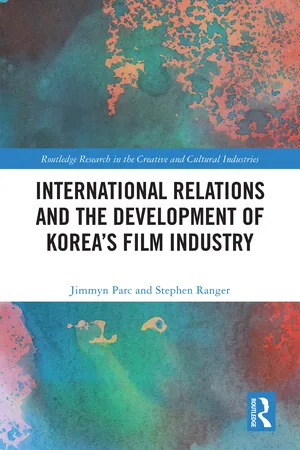
International Relations and the Development of Korea’s Film Industry
- English
- ePUB (mobile friendly)
- Available on iOS & Android
International Relations and the Development of Korea’s Film Industry
About this book
This book examines the evolution of the Korean film industry, presenting a comprehensive account from the early days of experimental screening to its current period of attracting increased foreign investment.
Exploring the Korean film industry's troubled past, this book covers occupation, civil war, authoritarianism, globalisation, and the continued uncertainties amidst geopolitical competition. It differs from other existing works by connecting the development of the Korean film industry to the country's international relations. Furthermore, it considers what impact this had on the industry itself rather than just on the content of the films produced. With such an approach, this book reveals the background and reasons for its achievements, ultimately providing an inspiring example of global success and an applicable benchmark for other film industries seeking their own international breakout.
By offering fresh insights and new information linking the past and present of the Korean film industry, the book serves as a useful companion to scholars of cultural studies, business history, Korean studies, and globalisation, even if they may not be familiar with the specifics of this dynamic industry. Moreover, this book can serve as a valuable reference for shaping the roadmap of audiovisual sectors—including the film industry—toward a promising future.
Frequently asked questions
- Essential is ideal for learners and professionals who enjoy exploring a wide range of subjects. Access the Essential Library with 800,000+ trusted titles and best-sellers across business, personal growth, and the humanities. Includes unlimited reading time and Standard Read Aloud voice.
- Complete: Perfect for advanced learners and researchers needing full, unrestricted access. Unlock 1.4M+ books across hundreds of subjects, including academic and specialized titles. The Complete Plan also includes advanced features like Premium Read Aloud and Research Assistant.
Please note we cannot support devices running on iOS 13 and Android 7 or earlier. Learn more about using the app.
Information
Table of contents
- Cover
- Half-Title Page
- Series Page
- Title Page
- Copyright Page
- Table of Contents
- List of Figures
- List of tables
- Prologue: Linking Korea’s film industry and international relations
- 1 The emergence under Japan’s imperialism (1903–1945)
- 2 The paradox of the Korean War (1945–1961)
- 3 Cold War dynamics and the developmental dictatorship (1961–1979)
- 4 Survival amidst US trade pressure (1980–1992)
- 5 Post-Cold War uncertainty and co-productions (1993–2000s)
- 6 The rise of China and its impact (2000s–present)
- Epilogue: : Global dialogues, local screens, and a continued journey
- Index